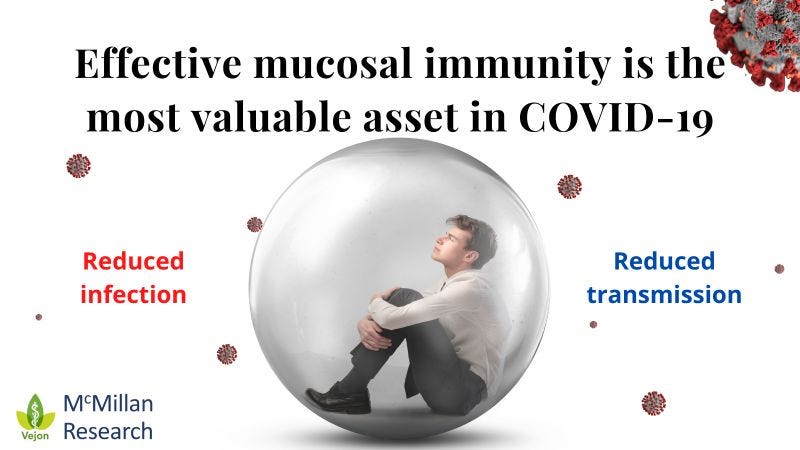If you understand this concept, everything else is easy to grasp about the COVID-19 pandemic.
There are many viruses around us all the time.
The upper airway has a sophisticated immune system to manage any viral or bacterial infection.
Iwasaki A, Foxman EF, Molony RD. Early local immune defences in the respiratory tract. Nat Rev Immunol. 2017 Jan;17(1):7-20
The systemic immune response (lymph nodes and blood) will mainly get activated if the pathogen gets past this mucosal wall of protection. The secondary response will be in lymph nodes to trigger T-cell and B-cell antibody production. There is no need for a systemic response if the virus cannot penetrate this defence.
Protection is usually quite broad, so any exposure to a coronavirus will produce some degree of protection in the future against others. The spike protein makes the most changes but the other parts of the virus remain relatively constant.
Made in Biorender
Our question for immunologists should be, why is this mucosal immunity not as effective in the COVID-19 pandemic? Especially after population exposure to Omicron.
The answer is to do with an altered immune response post vaccination. Essentially the immune system after vaccination is still focused on the original (Wuhan) variant. Watch the video below to understand more.
Please protect this natural mucosal immunity as essential for future exposure with COVID-19.











It seems quite simple and logical that it may very well be an evolutionary adaptation to avoid making long-lasting adaptive memory to the spike proteins of a coronavirus due to their propensity to mutate frequently. By relying on innate/generalized/mucosal immune responses (nk cells, non-specific circulating antibodies , memory tcells etc.) to functionally-constrained proteins, the body can generally ward off serious infection (from variants within the viral swarm ) albeit at the cost of not always being entirely successful at stopping it altogether (for instance when viral load is high or the when weakened due to stress, poor diet etc..). It's a trade off - better broader long, lasting protection but less specific protection. In this particular case, from what I have read, the SARS Cov-2 virus family appears to have a greater propensity to elicit a specific antigen antibody response due to the particularly toxic nature of the spike's interaction with the body. This sets up a catch-22: a broad innate response would be preferable but might be outgunned so to speak but an long-lasting adaptive would set one up for imprinting issues (though less likely in the natural infection vs transfection).
It's a difficult situation in light of the potential seriousness of infection (in some but not all) but the idea that the best solution is to force to the body (via inoculation) to manufacture a toxic protein (with unknown locations and quantity) AND potentially cement a spike-antibody response against this highly mutable virus is absolutely asinine.
Greater support of the innate immune system and early therapeutics were/are the most rational, scientific approach to combating this problem as antibodies are not a correlate of protection. One doesn't have to be a scientist to see the obvious 'flaws' in the pandemic response. It's hard for me to attribute this to simple incompetence but maybe that's just me.
Given all this, what mouthwash or nasal rinse protocol could one use to assist mucosal immunity in this area -- if any?